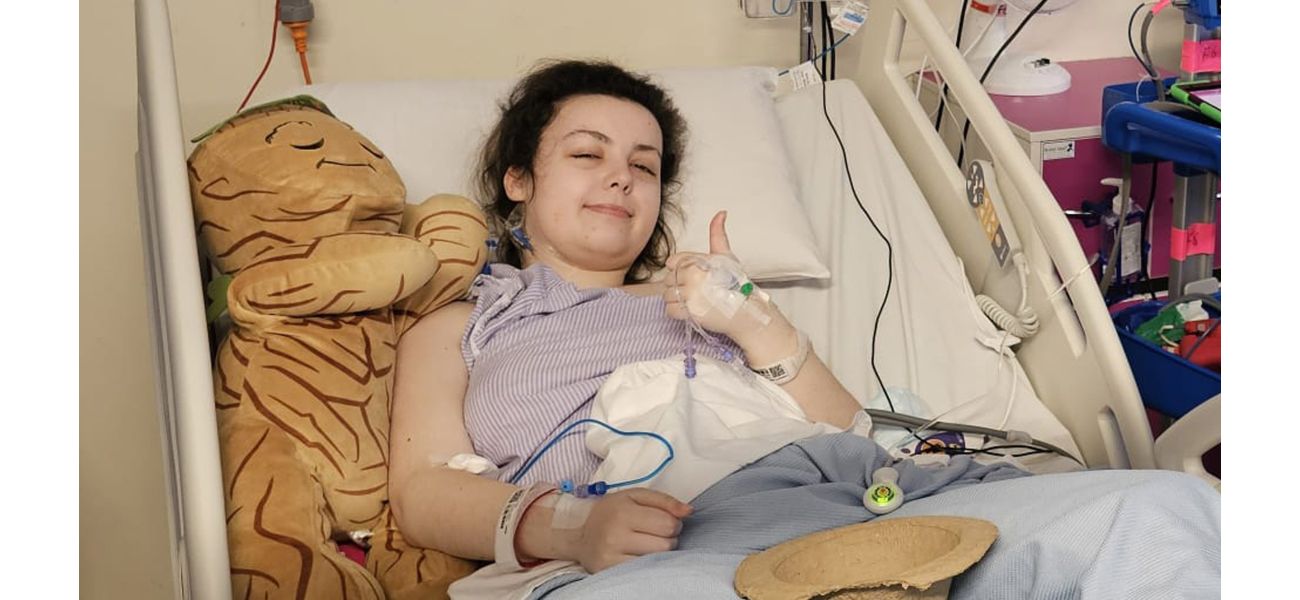Doctors told me I was too young and I ended up bleeding for a year.
I tried to continue as usual, but the bleeding persisted.
September 14th 2024.

It had taken Imali two long years to finally receive a diagnosis of severe ulcerative colitis. The journey had been difficult, with doctors often dismissing her symptoms and telling her she was too young to be sick. But finally, in 2023, a CT scan revealed the extent of her condition - her entire colon was inflamed and ulcerated.
It all started in 2021, when Imali began experiencing bleeding when she went to the bathroom. At first, she thought it might be due to her Ehlers-Danlos Syndrome, which causes her skin to tear easily. But as the bleeding persisted and her symptoms worsened, she knew something was seriously wrong. With a six-week wait to see her GP, Imali turned to A&E for help.
However, instead of receiving the care and support she needed, Imali was made to feel like she was wasting the doctors' time. She was even subjected to two pregnancy tests before the doctor finally did a rectal examination. Despite finding no signs of hemorrhoids, the doctor dismissed Imali's concerns and told her to come back in a year if her symptoms continued. Feeling frustrated and defeated, Imali tried to carry on with her life as normal, but the bleeding didn't stop.
It wasn't until two years later, in 2023, that Imali was able to receive a proper diagnosis. She had been consistently dismissed by doctors, and it nearly cost her her life multiple times. Imali had always struggled with stomach issues, but they had eased during her teens. However, at the age of 19, they came back with a vengeance and continued to worsen.
Inflammatory Bowel Disease, or IBD, is a condition where the immune system attacks the bowel, causing inflammation and symptoms such as diarrhea and extreme stomach pain. There are two main types of IBD, Crohn's disease and ulcerative colitis. While there is no cure for IBD, treatments can help manage symptoms.
Despite her symptoms becoming increasingly severe, Imali was constantly told by medical professionals that she was too young to be sick and that bad things don't happen to people her age. But she knew something was wrong and pushed for help. Finally, in 2023, her GP begrudgingly agreed to run tests, which revealed the severity of her condition.
Imali's entire colon was inflamed and ulcerated, and she was immediately put on steroids and received iron infusions to help with the anemia caused by her prolonged bleeding. However, the steroids only provided temporary relief and did not heal her bowel. After six months of medication and no progress, Imali sought a second opinion and was prescribed immunosuppressants - strong drugs similar to chemotherapy.
These drugs had severe side effects, causing Imali's hair to fall out and her skin to deteriorate. But despite her worsening condition, doctors continued to reassure her that the drugs would start working after her next dose. Unfortunately, Imali's condition was so advanced that she was never able to receive her next dose.
In 2024, Imali developed what she thought was a winter vomiting bug, but it turned out to be something much more serious. After three weeks of constant sickness and diarrhea, she finally took herself to A&E for fluids and nutrition. It was then that she realized she needed to advocate for her own health and seek the help she deserved.
It was a long and difficult journey for Imali to finally receive a diagnosis of severe ulcerative colitis. She recalls the moment she walked behind a flimsy blue curtain at the A&E and was asked by the doctor, "What brings you in today?" Feeling scared and embarrassed, she answered, "Well... I'm bleeding out of my bottom when I go to the loo, and I don't think that's normal." It was the year 2021 and Imali was only 20 years old at the time. Initially, she had attributed the bleeding to her condition known as Ehlers-Danlos Syndrome, which causes her skin to tear easily. But as her symptoms worsened, she knew something was seriously wrong. With a six-week wait to see her GP, Imali felt like she had no other choice but to go to the A&E for help. However, she was met with skepticism and made to feel like she was wasting their time.
The doctor did a rectal examination and dismissed her concerns, saying that the bleeding was just "typical" for someone her age and that she was "far too young" to have anything serious. Feeling like she had wasted everyone's time, Imali tried to carry on with her normal life, but the bleeding didn't go away. It wasn't until two years later that she finally received a diagnosis of severe ulcerative colitis, a type of Inflammatory Bowel Disease (IBD) that causes dangerous inflammation in the large intestine. Despite repeatedly telling doctors that something was wrong, Imali was consistently dismissed and it nearly cost her her life.
She has always had stomach issues, but they became more severe in 2020 when she was 19 years old. Her symptoms included extreme tummy pain and diarrhoea, which made her life difficult. She struggled to make it to the toilet on time and was often left feeling embarrassed and helpless. Trying to ignore her symptoms after the A&E doctor's dismissive attitude, Imali continued to bleed and her bowels became incontinent. She was confined to her house, wearing adult nappies at the age of 23. Her condition took over her life and she was constantly reminded by medical professionals that she was "too young to be sick" and that bad things don't happen to people her age.
After months of pushing for help, Imali's GP finally agreed to run some tests. The results showed severe inflammation in her stool and she was immediately put on steroids and given iron infusions to treat her anaemia. However, the steroids only provided temporary relief and every time she tried to taper off of them, her symptoms would return. It wasn't until she sought a second opinion that she was prescribed immunosuppressants, strong drugs similar to chemotherapy. Unfortunately, these drugs caused her hair to fall out and her skin quality to deteriorate, all while doctors kept telling her to wait for the next dose to start working. But her condition only continued to worsen and in February 2024, she ended up in A&E again, this time with severe sickness and diarrhoea that wouldn't go away.
Imali's story is a reminder of the difficulties and struggles faced by those with IBD. Inflammatory Bowel Disease is a medical term that describes conditions that can result in diarrhoea and extreme tummy pain. It occurs when the immune system attacks the bowel, causing inflammation. The two main types of IBD are Crohn's disease and ulcerative colitis, both of which are long-term conditions that can be managed with treatments. However, the journey to finding the right treatment and diagnosis can be long and difficult, as Imali experienced.
It is important to know the symptoms of ulcerative colitis, which include bleeding, diarrhoea, stomach cramping, and incontinence. Imali's journey serves as a reminder to listen to our bodies and advocate for our own health, even if it means seeking a second opinion or pushing for further tests. With proper treatment and support, those with IBD can lead fulfilling lives, despite the challenges they may face.
It all started in 2021, when Imali began experiencing bleeding when she went to the bathroom. At first, she thought it might be due to her Ehlers-Danlos Syndrome, which causes her skin to tear easily. But as the bleeding persisted and her symptoms worsened, she knew something was seriously wrong. With a six-week wait to see her GP, Imali turned to A&E for help.
However, instead of receiving the care and support she needed, Imali was made to feel like she was wasting the doctors' time. She was even subjected to two pregnancy tests before the doctor finally did a rectal examination. Despite finding no signs of hemorrhoids, the doctor dismissed Imali's concerns and told her to come back in a year if her symptoms continued. Feeling frustrated and defeated, Imali tried to carry on with her life as normal, but the bleeding didn't stop.
It wasn't until two years later, in 2023, that Imali was able to receive a proper diagnosis. She had been consistently dismissed by doctors, and it nearly cost her her life multiple times. Imali had always struggled with stomach issues, but they had eased during her teens. However, at the age of 19, they came back with a vengeance and continued to worsen.
Inflammatory Bowel Disease, or IBD, is a condition where the immune system attacks the bowel, causing inflammation and symptoms such as diarrhea and extreme stomach pain. There are two main types of IBD, Crohn's disease and ulcerative colitis. While there is no cure for IBD, treatments can help manage symptoms.
Despite her symptoms becoming increasingly severe, Imali was constantly told by medical professionals that she was too young to be sick and that bad things don't happen to people her age. But she knew something was wrong and pushed for help. Finally, in 2023, her GP begrudgingly agreed to run tests, which revealed the severity of her condition.
Imali's entire colon was inflamed and ulcerated, and she was immediately put on steroids and received iron infusions to help with the anemia caused by her prolonged bleeding. However, the steroids only provided temporary relief and did not heal her bowel. After six months of medication and no progress, Imali sought a second opinion and was prescribed immunosuppressants - strong drugs similar to chemotherapy.
These drugs had severe side effects, causing Imali's hair to fall out and her skin to deteriorate. But despite her worsening condition, doctors continued to reassure her that the drugs would start working after her next dose. Unfortunately, Imali's condition was so advanced that she was never able to receive her next dose.
In 2024, Imali developed what she thought was a winter vomiting bug, but it turned out to be something much more serious. After three weeks of constant sickness and diarrhea, she finally took herself to A&E for fluids and nutrition. It was then that she realized she needed to advocate for her own health and seek the help she deserved.
It was a long and difficult journey for Imali to finally receive a diagnosis of severe ulcerative colitis. She recalls the moment she walked behind a flimsy blue curtain at the A&E and was asked by the doctor, "What brings you in today?" Feeling scared and embarrassed, she answered, "Well... I'm bleeding out of my bottom when I go to the loo, and I don't think that's normal." It was the year 2021 and Imali was only 20 years old at the time. Initially, she had attributed the bleeding to her condition known as Ehlers-Danlos Syndrome, which causes her skin to tear easily. But as her symptoms worsened, she knew something was seriously wrong. With a six-week wait to see her GP, Imali felt like she had no other choice but to go to the A&E for help. However, she was met with skepticism and made to feel like she was wasting their time.
The doctor did a rectal examination and dismissed her concerns, saying that the bleeding was just "typical" for someone her age and that she was "far too young" to have anything serious. Feeling like she had wasted everyone's time, Imali tried to carry on with her normal life, but the bleeding didn't go away. It wasn't until two years later that she finally received a diagnosis of severe ulcerative colitis, a type of Inflammatory Bowel Disease (IBD) that causes dangerous inflammation in the large intestine. Despite repeatedly telling doctors that something was wrong, Imali was consistently dismissed and it nearly cost her her life.
She has always had stomach issues, but they became more severe in 2020 when she was 19 years old. Her symptoms included extreme tummy pain and diarrhoea, which made her life difficult. She struggled to make it to the toilet on time and was often left feeling embarrassed and helpless. Trying to ignore her symptoms after the A&E doctor's dismissive attitude, Imali continued to bleed and her bowels became incontinent. She was confined to her house, wearing adult nappies at the age of 23. Her condition took over her life and she was constantly reminded by medical professionals that she was "too young to be sick" and that bad things don't happen to people her age.
After months of pushing for help, Imali's GP finally agreed to run some tests. The results showed severe inflammation in her stool and she was immediately put on steroids and given iron infusions to treat her anaemia. However, the steroids only provided temporary relief and every time she tried to taper off of them, her symptoms would return. It wasn't until she sought a second opinion that she was prescribed immunosuppressants, strong drugs similar to chemotherapy. Unfortunately, these drugs caused her hair to fall out and her skin quality to deteriorate, all while doctors kept telling her to wait for the next dose to start working. But her condition only continued to worsen and in February 2024, she ended up in A&E again, this time with severe sickness and diarrhoea that wouldn't go away.
Imali's story is a reminder of the difficulties and struggles faced by those with IBD. Inflammatory Bowel Disease is a medical term that describes conditions that can result in diarrhoea and extreme tummy pain. It occurs when the immune system attacks the bowel, causing inflammation. The two main types of IBD are Crohn's disease and ulcerative colitis, both of which are long-term conditions that can be managed with treatments. However, the journey to finding the right treatment and diagnosis can be long and difficult, as Imali experienced.
It is important to know the symptoms of ulcerative colitis, which include bleeding, diarrhoea, stomach cramping, and incontinence. Imali's journey serves as a reminder to listen to our bodies and advocate for our own health, even if it means seeking a second opinion or pushing for further tests. With proper treatment and support, those with IBD can lead fulfilling lives, despite the challenges they may face.
[This article has been trending online recently and has been generated with AI. Your feed is customized.]
[Generative AI is experimental.]
0
0
Submit Comment





